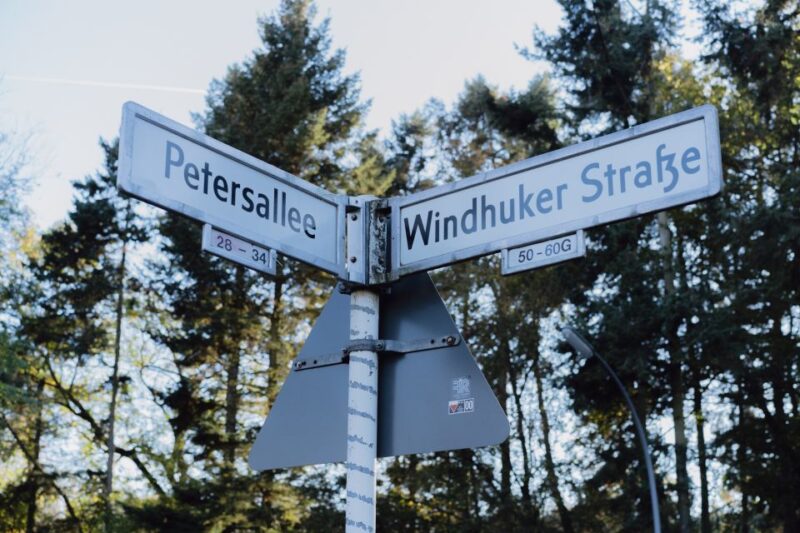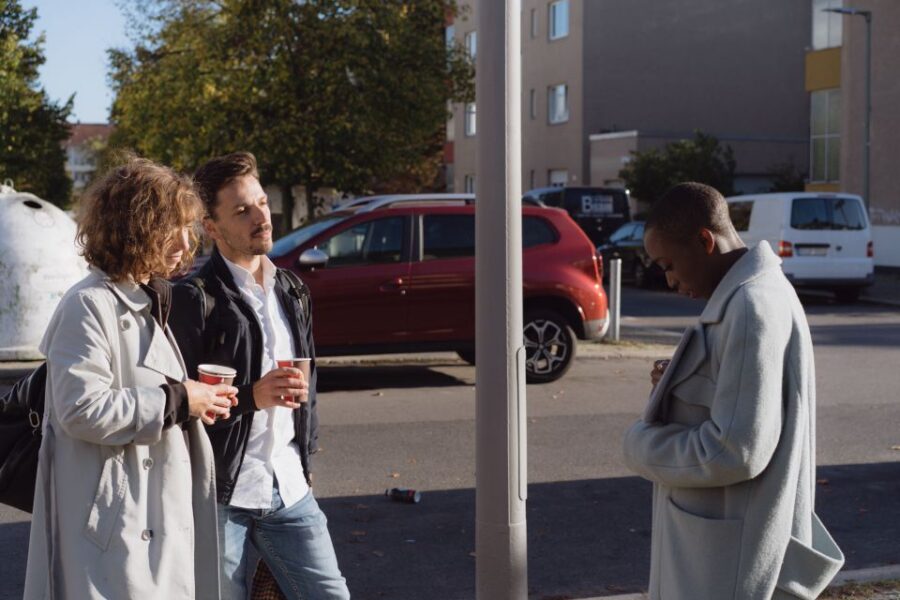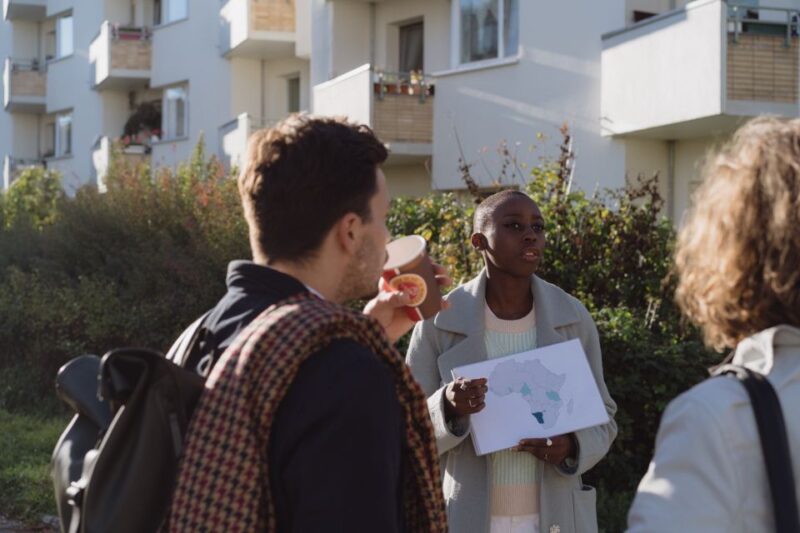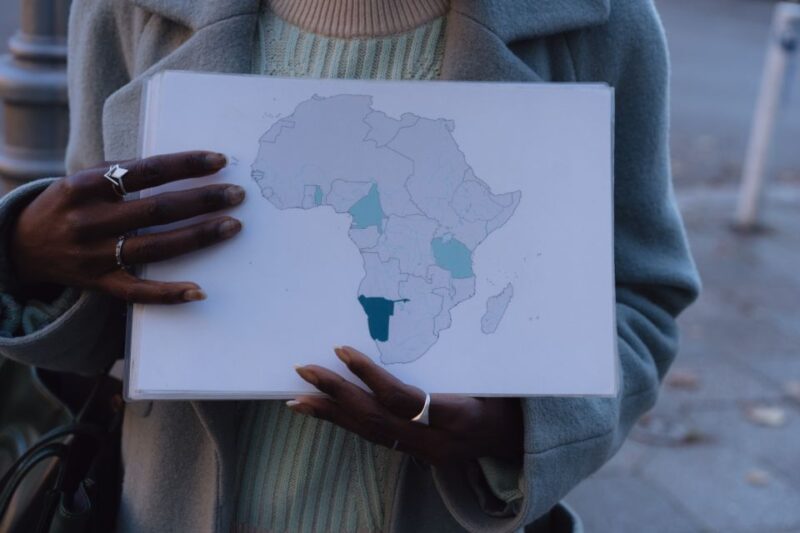The African Quarter Historical Guided Walking Tour in Berlin’s Wedding district offers a fascinating glimpse into the city’s complex colonial history. Delving into the impact of the industrial revolution and the Congo Conference on German-African relations, this 2-hour tour examines the legacies of key historical figures like Carl Peters. Conducted in English or German, the wheelchair-accessible experience provides insightful commentary that challenges visitors to consider the modern implications of this often-overlooked chapter in Berlin’s past. Those interested in exploring the nuances of colonial history won’t want to miss this educational adventure.
Key Points

- The guided walking tour explores the history and colonial legacies associated with the African Quarter in Berlin’s Wedding district.
- The tour discusses the impact of the industrial revolution on Germany’s colonization of several African nations and the lasting effects on Berlin.
- Participants will visit sites linked to historical figures like Carl Peters, Gustav Nachtigal, and Adolf Lüderitz, and learn about their roles in German colonial expansion.
- The tour examines the significance of the Berlin Conference (1884-1885) and its impact on reshaping the geopolitical landscape of Africa.
- The tour is suitable for adults interested in African colonization and German history, with commentary that may be challenging for those with hearing impairments.
Tour Overview

This guided walking tour of the African Quarter in Berlin’s Wedding district offers a 2-hour exploration of the area’s history and colonial connections.
Conducted in English or German, the tour provides an immersive experience at a price starting from £21.07 per person. Guests can expect a wheelchair-accessible experience with the option to cancel up to 24 hours in advance free of charge.
Led by knowledgeable guides, the tour delves into the impact of the industrial revolution on German-African relations and examines the colonial legacies in six African nations once under German rule.
With a focus on key historical figures and events, this tour offers a unique opportunity to understand Berlin’s complex ties to Africa.
If you're enjoying exploring Berlin on foot, you'll love these other walking tours we recommend
Experience Highlights

On this guided walking tour, guests explore the history of the African Quarter and its street names linked to African cities.
They discuss the impact of the industrial revolution on German-African relations, learning about colonial legacies in six African nations colonized by Germany.
The tour also visits sites connected to key historical figures like Carl Peters, Gustav Nachtigal, and Adolf Lüderitz, providing context on the significance of the Congo Conference in reshaping Africa.
Through this engaging experience, participants gain a deeper understanding of the complex ties between Germany and the African continent during the colonial era, examining the lasting effects of these historical events on modern-day Berlin.
Tour Details

The tour begins at Swakopmunder Strasse 44, in front of Rözi Backshop, with two scheduled start times – 11 am for the German-language tour and 2 pm for the English-language tour.
The walking tour lasts approximately 2 hours and includes a knowledgeable guide who’ll provide information about the African Quarter and its connections to Germany’s colonial past.
Participants will receive water on warm days, but hotel pickup and drop-off aren’t included.
The tour is wheelchair accessible, making it accessible to a wide range of visitors.
Participant Guidelines
Individuals under 10 years old, over 95 years old, or with hearing impairments may find the tour unsuitable.
The African Quarter walking tour isn’t designed for young children or the elderly, as the 2-hour duration and walking pace may prove challenging. Likewise, the tour guide’s commentary may be difficult for those with hearing issues to fully appreciate.
However, for adults with an interest in African colonization and German history, this informative experience is highly recommended. Participants will explore the neighborhood’s street names linked to African cities and learn about the lasting colonial legacies across the continent.
An engaging and educational outing for the right audience.
More Great Tours NearbyCustomer Feedback
Reviewers have overwhelmingly praised the African Quarter walking tour, awarding it an impressive 4.9/5 rating based on 21 reviews.
Guides have received high praise for their exceptional knowledge and engaging presentation styles, ensuring participants leave with a deeper understanding of the area’s complex history.
Participants also remarked on the informative nature of the tour, appreciating the opportunity to connect with others and explore this unique part of Berlin.
The tour is highly recommended for those interested in learning about African colonization and its lasting impact on German history.
The combination of an expertly curated experience and knowledgeable guides makes this a must-do activity for visitors to the city.
Loving the local insights? Here are more guided experiences we recommend in Berlin
- Berlin Self-Drive Trabi Tour With Guide
- 3.5-Hour Guided Original Craft Beer Tour in Berlin
- Berlin History Walking Tour With a French-Speaking Guide
- River Cruise With Tour Guide (Ger./Engl.) Berlin. Hadynski
- The Memorial Tour: Visit to Sachsenhausen Concentration Camp (Licensed Guide)
- Berlin: Boat Tour With Tour Guide
German-African Relations
The industrial revolution profoundly shaped German-African relations, as the nation’s growing economic and political ambitions led to the colonization of several African nations in the late 19th century. Germany’s colonialist policies in Africa were driven by a desire for resources, trade, and geopolitical influence. This had lasting impacts, both positive and negative, that continue to reverberate today.
| Colonized Nations | German Interests |
|---|---|
| Namibia | Diamonds, Copper, Wool |
| Cameroon | Cocoa, Coffee, Rubber |
| Togo | Palm Oil, Cocoa, Coffee |
The Berlin Conference of 1884-1885, also known as the Congo Conference, further solidified Germany’s colonial foothold in Africa, with lasting implications for the continent’s development and the ongoing legacies of European imperialism.
Colonial Legacies
Germany’s colonial legacies in Africa have had far-reaching and complex impacts, both tangible and intangible, that continue to reverberate across the continent and its diaspora to this day.
The tour explores the lasting influence of German colonization in six African nations, examining how it shaped political, economic, and societal structures that persist even after independence.
Visitors gain a deeper understanding of how colonial-era figures like Carl Peters and Gustav Nachtigal left their mark, both celebrated and controversial.
Ultimately, the tour sheds light on the complex web of colonial legacies, encouraging thoughtful reflection on this history and its ongoing implications for Africa and the world.
Congo Conference Impact
Building on the exploration of Germany’s colonial legacies in Africa, the tour examines the significant impact of the Congo Conference, which reshaped the continent’s geopolitical landscape. This pivotal event, convened by European powers in the late 19th century, had far-reaching consequences that continue to shape modern-day Africa.
The conference’s outcome, the Berlin Act of 1885, effectively divided Africa into spheres of influence for colonial powers, with the Congo Free State established as the personal fiefdom of King Leopold II of Belgium. This set the stage for decades of exploitation and oppression, leaving an indelible mark on the region.
The tour delves into this dark chapter, shedding light on how the Congo Conference’s legacy continues to reverberate in the region.
Frequently Asked Questions
Is the Tour Suitable for People With Limited Mobility?
The tour is wheelchair accessible, indicating it is suitable for people with limited mobility. However, the tour may not be suitable for those over 95, as participant guidelines specify it is not recommended for individuals in that age group.
What Is the Group Size for the Tour?
The group size for the tour is not explicitly stated in the information provided. However, it notes the tour is wheelchair accessible, suggesting it can accommodate small to medium-sized groups. Specific group size limits are not mentioned.
Can the Tour Be Customized for a Specific Interest?
The tour can likely be customized for specific interests. While the standard tour covers the history and colonial legacy, the guide may be able to tailor the experience to focus on areas of particular interest to participants.
Is There an Option to Extend the Tour Duration?
Yes, the tour duration can be extended for an additional fee. Guests can inquire about extending the 2-hour tour when booking to accommodate their interests and schedule. Customized tour options may also be available.
Are There Any Discounts Available for Students or Seniors?
Unfortunately, the tour information does not mention any discounts for students or seniors. The standard tour price is €21.07 per person. Travelers may want to inquire with the tour operator about potential discounted rates for specific groups.
Recap
The African Quarter Historical Guided Walking Tour offers a unique opportunity to explore Berlin’s colonial past.
Participants can explore significant sites, learn about key historical figures, and gain insights into the complex relationship between Germany and Africa.
The tour’s wheelchair accessibility and commentary in English or German make it an educational and accessible experience for adults interested in understanding the legacies of colonialism and its modern implications.
You can check availability for your dates here:More Walking Tours in Berlin
More Tours in Berlin
More Tour Reviews in Berlin
Not for you? Here's more things to do in Berlin we have recnetly reviewed
- 5 Best Craft Beer Tours And Tastings In Berlin
- 3 Best Shopping Tours In Berlin
- 7 Best Christmas Experiences In Berlin
- 16 Best Dining Experiences In Berlin
- 2 Best 2 Day Tours In Berlin
- 4 Best Lunch Experiences In Berlin
- 2 Best Full-Day Tours In Berlin
- 15 Best Photography Experiences In Berlin
- 12 Best Dinner Tours In Berlin
- 25 Best Cruises And Boat Tours In Berlin
- 25 Best Food Tours In Berlin
- Third Reich Quest Experience in Berlin
